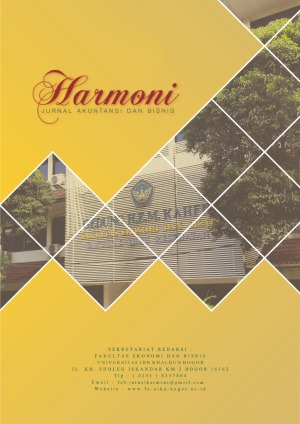Analysis Of Company Performance Measurement From Balanced Scorecard Approach (Case Study At Pt. Intihati Properti, Bogor)
DOI:
https://doi.org/10.32832/jharmoni.v1i1.7216Keywords:
Performance Measurement, Balanced ScorecardAbstract
This study aims to determine the performance of the company PT. Intihati Properti considers four balanced scorecard perspectives, namely customer perspective, internal business process perspective, and learning and growth perspective. The research method used is descriptive research method. Data collection methods used are interviews and questionnaires. The results of this study indicate that the analysis of performance measurement viewed from a financial perspective as a whole is considered a bad company. it can be seen from the measurement results of the current ratio, total assets turnover, and return on assets every year that always decreases. The results from the customer's perspective are rated poorly. This can be seen from the acquisition of new customers every year which always decreases and the expected target is not achieved. performance measurement results from the perspective of internal business processes are generally considered poor. This can be seen from the innovations that are developed every year. Outcomes from a learning and growth perspective are considered poor. This can be seen from the decline in profitability and employee productivity from year to year which is not as expected. Although the employee satisfaction score of 88.4% is considered good or positive, it is necessary to evaluate the level of satisfaction in terms of organizational culture and leadership which gets the highest negative score. From the comprehensive results of the four balanced scorecard perspectives at PT. Intihati Properti is shown by considering the criteria for a total three-year performance score from 2018 to 2020 of 16.56% in the CC category. means that the performance of the company PT. Intihati's property is classified as "unhealthy".
References
Adi, F. M. (2016). ANALYSIS OF COMPANY PERFORMANCE MEASUREMENT WITH BALANCED SCORECARD APPROACH IN DEEPUBLISH BOOK PUBLISHING COMPANY CV.BUDI UTAMA YOGYAKARTA.
Fauziah, N. N., & Wahyuningtyas, R. (2020). The Effect of Digital Innovation Implementation on Company Performance Based on Employee Perception (Case Study at PT. Indonesia Power UPJP Kamojang). Journal of Management Partners, 4(9), 1651–1663.
Gaspersz, V. (2007). Lean Six Sigma for Manufacturing and Service Industries. PT. grammar.
Hanuma, S. (2010). Balanced Scorecard Analysis as a Company Performance Measurement Tool. 1–24.
Hanuma, S. (2011). Balance Scorecard Analysis as a Company Performance Measuring Tool (Case Study at PT. Astra Honda Motor). H Social Sciences>HG Finance, 1–24.
Sandika, & Andini, K. W. (2020). The Effect of Motivation, Job Satisfaction, and Work Discipline on Employee Performance. II(1), 162–172.
Aziz Alimul Hidayat. (2021). Develop Research Instruments & Validity-Reliability Test - Google Books. In Health Books Publishing. Health Books Publishing.
Rangkuti, F. (2011). SWOT BALANCED SCORECARD Techniques for Developing Effective Corporate Strategies plus How to Manage Performance and Risk. PT. Media Core Center.
Rangkuti, F. (2013). SWOT – Balance Scorecard - Freddy Rangkuti - Google Books. Main Library Gramedia.
Sinaga, O. S., Hasibuan, A., Priyojadmiko, E. E., & Etc. (2020). Performance Management in Organizations. Our Writing Foundation.
Soemohadiwidjojo, A. T. (2017). SIX SIGMA Statistic-Based Company Performance Measurement Method. Achieve Success.
Syariati, D., Rosalina, K., Azriani, N. R., & Iqbal, S. (2013). BALANCED SCORECARD Practical Guide to the Manufacturing Industry. Universitas Brawijaya Press.
Downloads
Published
How to Cite
Issue
Section
License
|
|




















